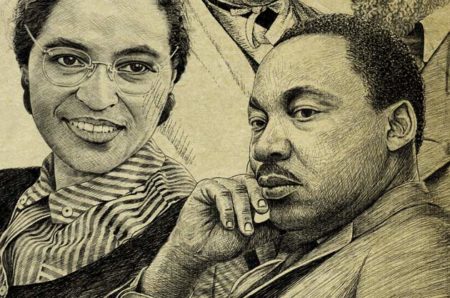
Vanderbilt’s annual celebration of Black History Month will kick off Monday, Feb. 3, at the Bishop Joseph Johnson Black Cultural Center with the first of many events planned throughout February. The month will include film screenings, lectures, celebratory programs and more.
“Black History Month is a time to acknowledge and celebrate the history, accomplishments and experience of Black people on our campus, in our country and globally,” said Rosevelt Noble, assistant dean of residential colleges, director of the Bishop Joseph Johnson Black Cultural Center and senior lecturer in the Department of Sociology. “I hope the residual impact of our programming lineup carries far beyond the 29 days in the month and far beyond the self-imposed boundaries we place on ourselves and others.”
The Black Cultural Center has created an online calendar of events happening throughout the month, including those hosted by the center and partnering offices, departments and organizations.
Among the programming and events scheduled in February:
- Black History Month Kickoff, Feb. 3: The Black Cultural Center will host a kickoff from noon to 3 p.m. The program, which is free and open to all Vanderbilt community members, will feature vibrant music, free food, a presentation on the historical significance of the month, and an overview of events to come.
- Vanderbilt Haiti Week, Feb. 3–6: Vanderbilt’s Center for Latin American Studies, in collaboration with departments and centers across campus, will host the fourth annual Vanderbilt Haiti week. Learn more about the schedule of events in MyVU. >>
- 2nd Annual Black History Immersion Excursion, Feb. 7–9: The Black Cultural Center is sponsoring a free excursion to Birmingham and Mobile, Alabama, and New Orleans, Louisiana, as part of the 2020 Black History Immersion Excursion. During the excursion, students, faculty and staff will learn more about the racial history of slavery, key moments of and individuals involved in the civil rights movement, mass incarceration, voting rights and more. Stops on the trip include the Birmingham Civil Rights Institute, 16th Street Baptist Church, National African American Archives and Museum, Whitney Plantation, French Quarter and more. The trip is co-sponsored with the Office of Housing and Residential Experience and the Department of African American and Diaspora Studies (registration for this is now full).
- Screening of True Justice: Bryan Stevenson’s Fight for Equality, Feb. 10: The Black Cultural Center and the Vanderbilt Prison Project will host a screening of the documentary True Justice, which shares the story of Alabama public interest attorney Bryan Stevenson, the founder and executive director of the Equal Justice Initiative. Stevenson has long been an advocate for the incarcerated and condemned and has fought to eradicate racial discrimination in the criminal justice system. The screening will be held in Sarratt Cinema from 5:30 to 7:30 p.m.
- 12th Annual Murray Lecture, Feb. 12: The 2020 Murray Lecture will feature Anthony Abraham Jack, assistant professor of education at the Harvard Graduate School of Education and author of The Privileged Poor: How Elite Colleges are Failing Disadvantaged Students. The program will be held at Sarratt Cinema from 6:30 to 8:30 p.m.
- Kitchen Table Series – Black Women and Social Activism, Feb. 18: The Kitchen Table Series program will focus on the contributions of black women to social activism, including how black women have founded and worked in movements like Black Lives Matter and #MeToo. The discussion, hosted by the Margaret Cuninggim Women’s Center, will be held in Sarratt 189. The program begins at 5 p.m. and dinner will be provided.
- Screening of Triumph the Untold Story of Perry Wallace, Feb. 19: The Black Cultural Center will host a screening of the documentary Triumph, which tells the story of Perry Wallace, BE’70, the first African American varsity basketball player in the Southeastern Conference. The Feb. 19 screening will be held at the Black Cultural Center auditorium from 6:30 to 8:30 p.m.
Recognized each year during the month of February, Black History Month is a time to recognize, honor and reflect on the history, accomplishments and contributions of African Americans throughout history. Initially titled Negro History Week, it was launched in 1926 by historian Carter G. Woodson, one of the first African Americans to earn a doctorate from Harvard. Woodson timed the week to coincide with the birthdays of Fredrick Douglass and President Abraham Lincoln. By the late 1960s, many college campuses expanded the week into a monthlong celebration throughout February. In 1976, Gerald R. Ford became the first president to officially recognize Black History Month.
To learn more about Black History Month and events throughout February, visit the Black Cultural Center website.